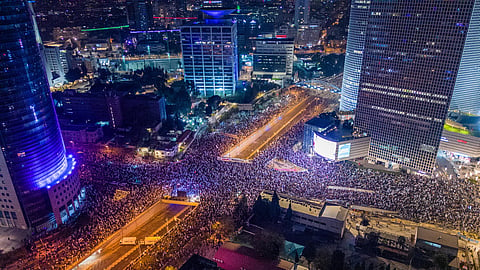

There have been protests in Israel for at least five consecutive days, with tens of thousands taking to the streets in protest against controversial decisions taken by the government of Israeli Prime Minister Benjamin Netanyahu. The demonstrations, having reached a boiling point with a full-blown constitutional crisis, have created fears that society is becoming increasingly divided and may even fragment into civil war, a former top Israeli judge stated.
The unrest is driven by a combination of anger at the government's handling of the ongoing conflict with Hamas, its apparent inability to release hostages in Gaza, and its attempts to consolidate power by targeting key institutions and officials. The immediate trigger for the latest wave of protests was Netanyahu's decision to dismiss Ronen Bar, the head of Israel's internal security agency, Shin Bet. But the prime minister's move to violate a two-month-old truce in Gaza with a series of lethal airstrikes further enraged the public.
Netanyahu's administration on Sunday passed a motion of no-confidence against the attorney general, the most recent in a sequence of actions against members of staff who have been viewed as being against the government. The measure has been severely criticized as an assault on Israel's democratic institutions and the rule of law, adding to the energy of protesters who thronged the streets for a sixth day.
Most Israelis want the hostages in Hamas' custody released following the October 7th 2023 attack, according to Ari Shavit, an Israeli author and commentator who was interviewed by CNN. But they want "Hamas to be crushed," he said. In contrast to Netanyahu's vow of a large-scale military campaign aimed at defeating Hamas and releasing the hostages, the campaign has continued for months without achieving its self-declared goals. This disaster has left most Israelis extremely distrustful of Netanyahu's leadership and augmented public outrage.
The protests have paralyzed daily life across the country, with main roads closed and burning scenes in Jerusalem and Tel Aviv. At least 12 individuals have been arrested by police as protesters fought with security forces. Activists claim the protests are increasing, and expect even larger protests in the coming days.
The protesters accuse the government of prolonging the war for political reasons and ignoring the destiny of the 59 hostages still in the hands of Hamas—some 24 of whom are believed to be alive. "This government has also initiated a war, again, to protect itself, to divert the conversation from the issues that unsettle the Israeli public". "The government has lost all legitimacy on all possible levels … They are failing," said Eitan Herzel, an Israeli protestor and antu-government activist.
On Wednesday, thousands of people packed the streets outside Netanyahu's Jerusalem residence in the center of the city, waving Israeli flags and holding placards with messages such as "Hostage Deal Now" and "Save Our Democracy." Drummers drummed and chanted as they marched from everywhere in the country to demand a new ceasefire in Gaza and to protest what they see as a threat to Israel's democratic institutions by Netanyahu's right-wing government.
"All they seek is power, and they're barging on the kidnapped and on the principles upon which the State of Israel was built—that we value life and morality," said Sharon Huderland, a participant in the march at Netanyahu's Jerusalem office.
The crisis has also drawn in leading institutions, foreshadowing the threat of a broader collapse of society. In a dramatic move, Jerusalem's Hebrew University administration declared that it would shut down the university if the government disregarded Supreme Court rulings on the dismissal of officials. This drastic action demonstrates the deepening rift between the government and Israel's civil society.
As the protests grow stronger, only time will reveal whether Netanyahu's government will weather this or whether the country stands on the brink of further unrest. With the popularity of the government at an all-time low and the Gaza war with no end in sight, Israel stands at one of its lowest points in recent history.